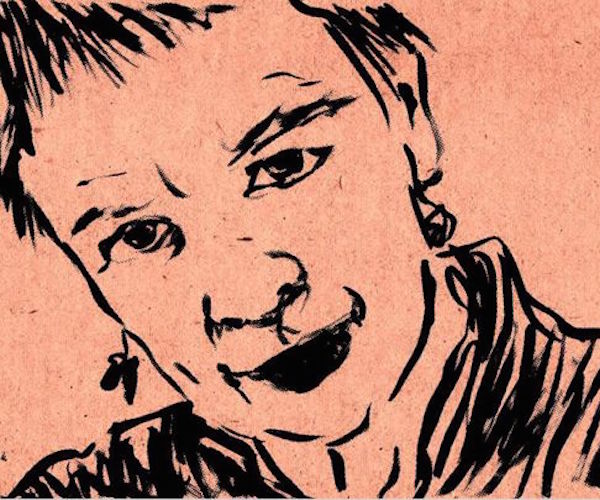Film Review: Laurie Anderson’s “Heart of a Dog”—Death, Observed
Laurie Anderson’s abstract drawings, 8mm documentary, found footage, scratched-on celluloid, and brief dramatizations are combined in a frequently mesmerizing way.
Heart of a Dog, directed by Laurie Anderson. At the Kendall Square Cinema.

Laurie Anderson’s “Heart of a Dog”—a clear-eyed movie about mortality.
By Gerald Peary
“Every love story is a ghost story,” said David Foster Wallace. Laurie Anderson’s heartfelt, tender Heart of a Dog has a ghostly mastodon in the room. It’s Anderson’s late legendary husband, Lou Reed, who died in 2013. Except for some voiceover allusions to “we” and one shot in which Reed, unidentified, play-acts a physician, he’s not in this film at all, even though it’s principle obsession is death and bereavement. It’s only at the final rolling credits that the ex-Velvet Underground rocker rises up. His fine song, “Turning Time Around,” is on the soundtrack, followed by his wife’s poignant memorial: “Dedicated to the magnificent spirit of my husband, Lou Reed, 1942–2013.”
Spirit as in ghostly spirit?
I saw an Anderson one-person stage performance about 20 years ago, an evening of whimsical, philosophical, sometimes autobiographical ruminations and observations.These were backed by a flow of drawings which were animated and projected behind her on a screen. Heart of a Dog, the movie, is pretty much the same, with Anderson the live monologist returning in voiceover and with images akin to what I witnessed two decades ago. These images seem plucked from an audience-friendly experimental film: Anderson’s abstract drawings, 8mm documentary, found footage, scratched-on celluloid, brief dramatizations, combined in a frequently mesmerizing way.
The recent deaths which are contemplated in Heart of a Dog are those of Anderson’s much-loved rat terrier Lulabelle and of Anderson’s mother, who, pointedly, she did not love. Oh, Lulabelle, the heart of the movie. A pointy-eared rescue dog of probing eyes and sharp intelligence, Lulabelle was transported by her owner to Northern California so they could escape the malaise of NYC after 9/11. Anderson’s plan, she said, was to test if her canine might actually do what scientists claimed of rat terriers, understanding up to 500 spoken words. She even dared wonder if, the two intimately bonding away from civilzation, could lead to Lulabelle actually talking. Anderson quickly abandoned her experiment. Coastal California was just too beautiful, her daily walking with Lulabelle through the green grass on the way down to the ocean.
Back home in the West Village, Lulabelle went King Lear-blind. Her trainer, a woman named Elizabeth, decided, with the blessing of Anderson, that this was a time not for pity but for artistic aspiration. Soon, Lulabelle was creating abstract paintings, her nails scratching into canvasses, and also sculptures, her feet pushed into clay. But most remarkable was her piano playing. Anderson has amazing footage of Lulabelle at the keyboard, alternately barking, howling, and then raising a paw (sometimes right, sometimes left) and pounding, making arbitrary almost-music. John Cage would approve.
Finally, death came to this great dog. She was brought home from the veterinary clinic, where they’d wanted to put her to sleep by injection. Instead, she succumbed with dignity in her Greenwich Village quarters. There’s a touching photo of Lulabelle, a carcass in a comfy living room chair.
As for mom, Anderson went to visit her, dutifully. “I heard my mother was dying,” the filmmaker says in voiceover. “But I don’t love her.” How can this unfeeling daughter open her heart? Perhaps through a Buddhist exercise called “the Mother Meditation.” You locate a moment in the past when your mother really loved you without reservation. You take that moment, absorb it, and spread it to the world so that you are everyone’s mother. But Anderson could not recall her mother’s adoration. Until she thought and thought and thought.
One winter when she was a child, Laurie was with two of her younger siblings skating on a pond when the ice cracked. She leapt into the water, swam under the ice, and rescued them. All her mother could say was, “I didn’t know you were that good a swimmer.” That odd sentence, Anderson decided, was the moment of transcendent maternal love. So she could be there for her mother when her mother expired, staring at the ceiling and saying mysteriously, “Tell the animals. All the animals…”
Tell them what?
When Lulabelle died, Anderson looked for solace in The Tibetan Book of the Dead. “The purpose of death is the release of love,” said that holy book, with its valediction forbidding mushy mourning. For the dog, for mom, for Anderson’s dear departed husband, Lou Reed. “No crying. It’s confusing for them.” Instead, this clear-eyed movie.
Gerald Peary is a professor at Suffolk University, Boston, curator of the Boston University Cinematheque, and the general editor of the “Conversations with Filmmakers” series from the University Press of Mississippi. A critic for the late Boston Phoenix, he is the author of nine books on cinema, writer-director of the documentaries For the Love of Movies: the Story of American Film Criticism and Archie’s Betty, and a featured actor in the 2013 independent narrative Computer Chess.
